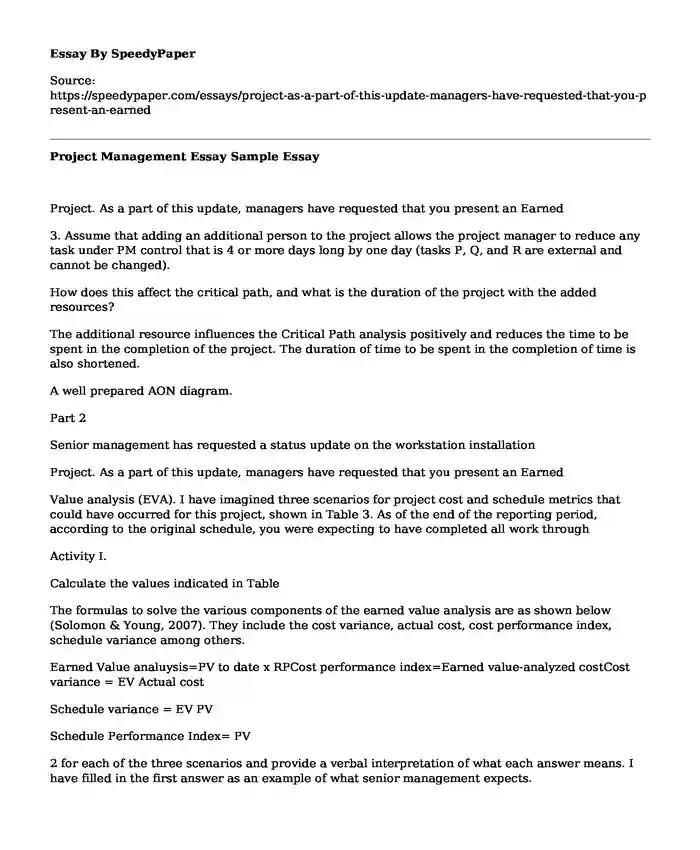
| Type of paper: | Essay |
| Categories: | Project management Management |
| Pages: | 3 |
| Wordcount: | 705 words |
Project. As a part of this update, managers have requested that you present an Earned
3. Assume that adding an additional person to the project allows the project manager to reduce any task under PM control that is 4 or more days long by one day (tasks P, Q, and R are external and cannot be changed).
How does this affect the critical path, and what is the duration of the project with the added resources?
The additional resource influences the Critical Path analysis positively and reduces the time to be spent in the completion of the project. The duration of time to be spent in the completion of time is also shortened.
A well prepared AON diagram.
Part 2
Senior management has requested a status update on the workstation installation
Project. As a part of this update, managers have requested that you present an Earned
Value analysis (EVA). I have imagined three scenarios for project cost and schedule metrics that could have occurred for this project, shown in Table 3. As of the end of the reporting period, according to the original schedule, you were expecting to have completed all work through
Activity I.
Calculate the values indicated in Table
The formulas to solve the various components of the earned value analysis are as shown below (Solomon & Young, 2007). They include the cost variance, actual cost, cost performance index, schedule variance among others.
Earned Value analuysis=PV to date x RPCost performance index=Earned value-analyzed costCost variance = EV Actual cost
Schedule variance = EV PV
Schedule Performance Index= PV
2 for each of the three scenarios and provide a verbal interpretation of what each answer means. I have filled in the first answer as an example of what senior management expects.
The analysis of the scenario one means that the project will be fully completed without any constraints as there are enough resources. The time frame put in place is realistic hence will enable the project to be completed (Collins, 2011).
The scenario 2 means that the project will be completed but with a little undertaking as the resources are not sufficiently provided. Also, the time frame is not so much flexible hence the reason for strain during implementation.
The scenario 3 is totally out of control as the project lacks enough resources at all to see it run smoothly and effectively. Also the time estimated for the project completion is totally unreasonable.
2. Provide a written interpretation of the results. For each scenario:
a. What would be the implications for managing the project (e.g., corrective actions, if any)?
The implications for managing the project is that it will fully stall approaching the end of the project (Norton, 2007). This is because there will not be a constant flow of money to be able sustain the project. There are several risks and challenges that are faced during the implementation of the proposed project (Dobson & Dobson, 2012).
Also, the project will not be a success as a result of less time to help run the project to completion. The distribution of the estimated time for the project completion was not fairly considered. Approaching the end of the project implementation, less time was allocated hence inaccurate implementation (Wiggers, Kok & De Boer-de Wit, 2004).
b. What statement would need to be made to the project stakeholders?
The recommendations to be made to the project stakeholders are that the overall cost that has been estimated should be targeted (Bonham, 2005). The actual cost should be equal to the estimated or less by a small margin. This ensures that the project is successfully implemented without straining.
Another issue to be considered is the fact that the time frame must be well spread so as to support the whole project (Collins, 2011). At no particular point should the project lapse because of lack of enough time to implement the project.
References
Collins, R. (2011). Project management. New York: Nova Science Publishers.
Solomon, P., & Young, R. (2007). Performance-based earned value. Hoboken, NJ: John Wiley.
Bonham, S. (2005). IT project portfolio management. Boston: Artech House.
Wiggers, P., Kok, H., & De Boer-de Wit, M. (2004). IT performance management. Oxford:
Butterworth-Heinemann.
Norton, A. (2007). Integrated management. Oxford: CIMA/Elsevier.
Dobson, M., & Dobson, D. (2012). Project risk and cost analysis. [Place of publication not identified]: American Management Association.
Cite this page
Project Management Essay Sample. (2019, Jun 10). Retrieved from http://land-repo.site.supplies/essays/project-as-a-part-of-this-update-managers-have-requested-that-you-present-an-earned?pname=speedypaper.com
Request Removal
If you are the original author of this essay and no longer wish to have it published on the SpeedyPaper website, please click below to request its removal:
- Reaching Higher Levels Language Proficiency, Free Paper Sample
- Comparative Analysis Essay Sample on Two Articles about Fast Food
- Essay Example on the Short Story Cathedral by Raymond Carver
- Law Essay Sample on Mistakes, Fraud, and Voluntary Consent
- Essay Sample: The American Dream's Provisions Regarding Social Status and Homeownership
- Essay Example on Rugby Sport and Performance Enhancement Drugs
- Capco's Organizational Structure Case Study
Popular categories




